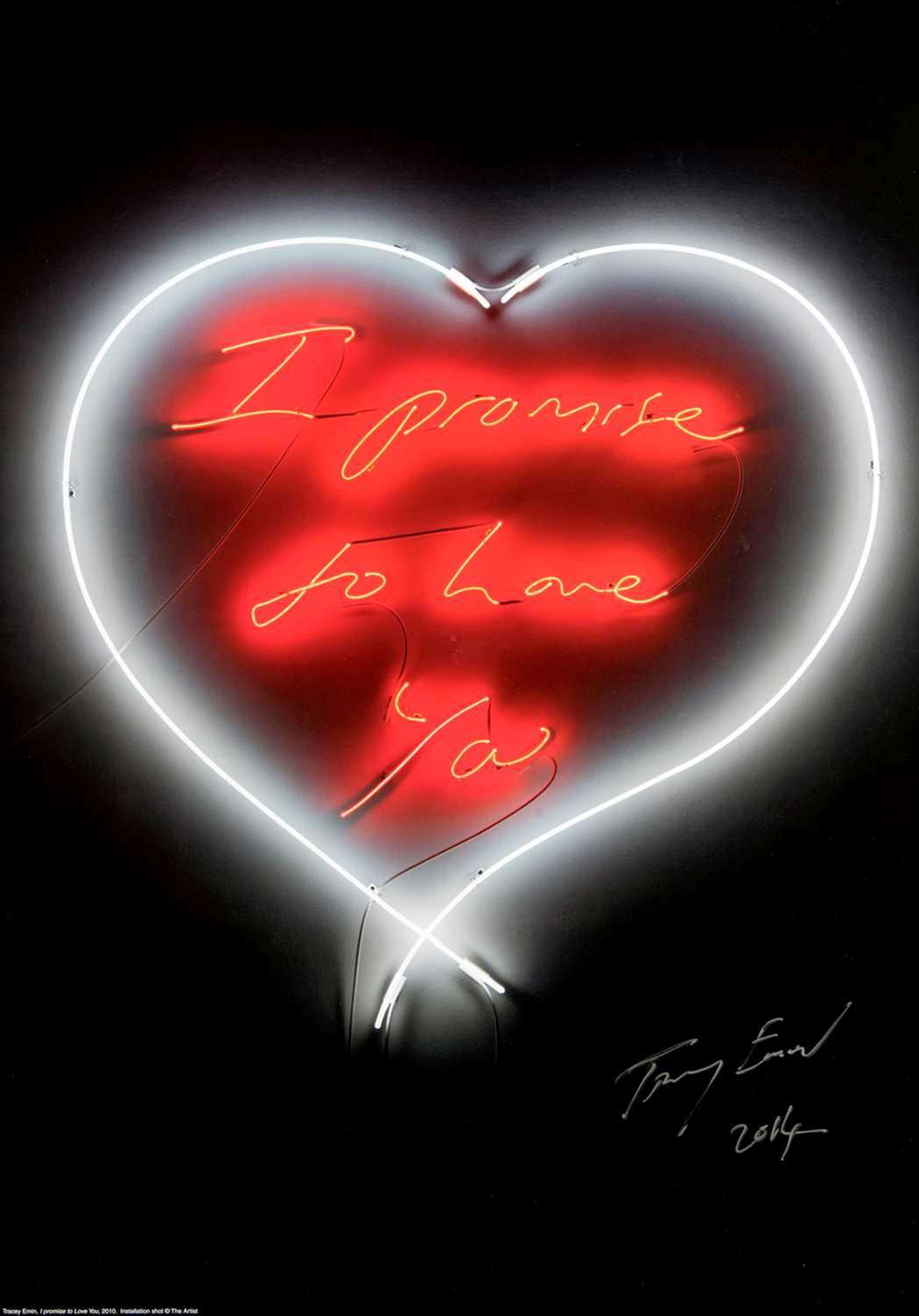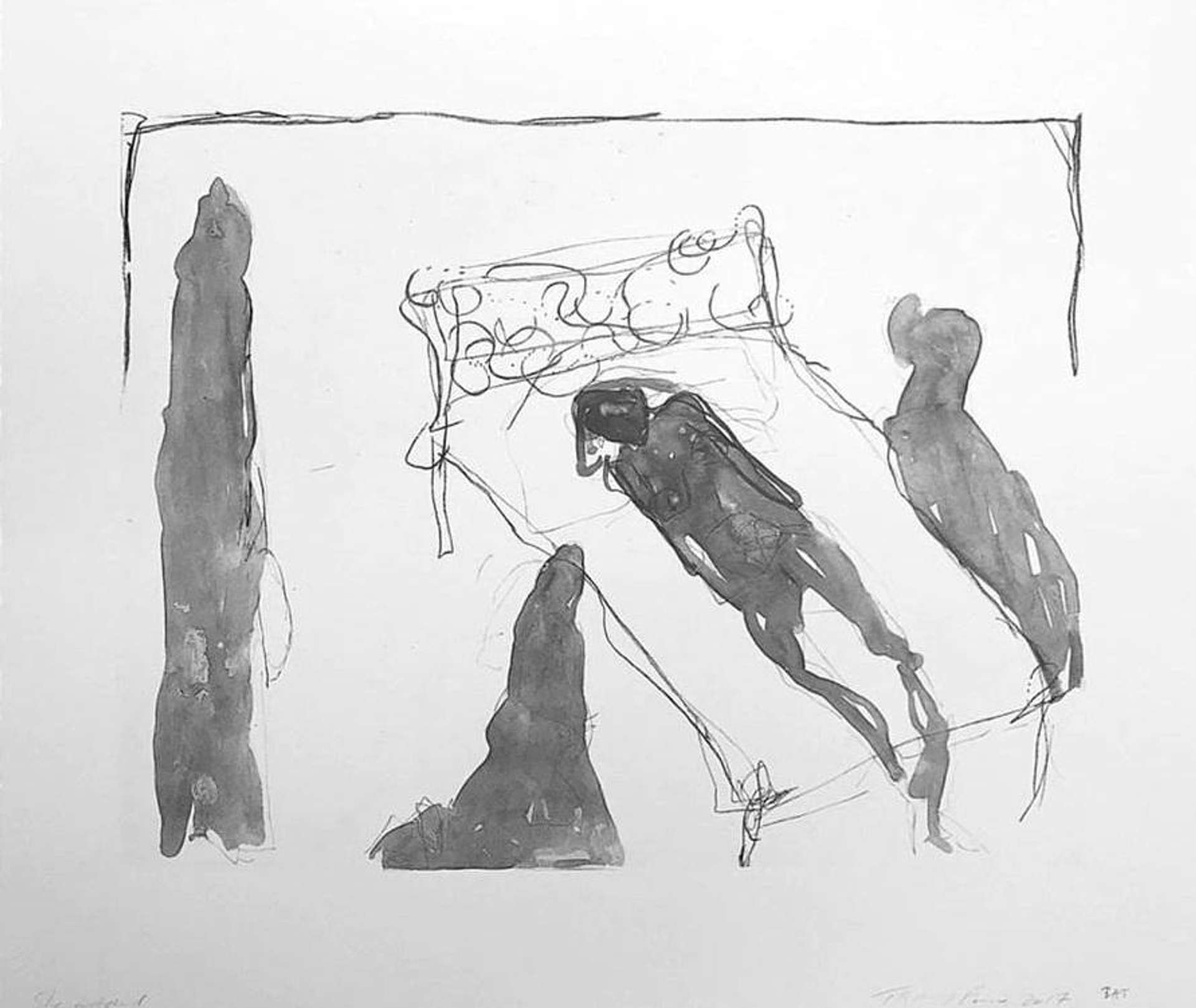Just Waiting: Tracey Emin’s New Print Run With Counter Editions

 Just Waiting © Tracey Emin 2022 / Limited Edition Lithograph produced by Counter Studio, Margate. Courtesy Tracey Emin and Counter Editions.
Just Waiting © Tracey Emin 2022 / Limited Edition Lithograph produced by Counter Studio, Margate. Courtesy Tracey Emin and Counter Editions.
Tracey Emin
142 works
Tracey Emin has been a renowned British artist since her emergence as part of the Young British Artists generation that gained prominence in the 1990s. She has worked in a variety of mediums including painting, sculpture, drawing, film, photography, neon text and installation art. Emin is particularly noted for her provocative and personal works that often explore themes of love, sexuality and identity, including her own life experiences.
Throughout her career, Emin has produced a significant body of work in prints and editions, finding that the medium allows her to reach a wider audience than the exclusive world of one-off pieces and gallery shows. To celebrate her 60th birthday and her latest public commission (the doors of the National Portrait Gallery in London), she has created a new work called Just Waiting.
Tracey Emin: Her Life and Rise to International Fame
Emin was born in London in 1963 and raised in the seaside town of Margate. Emin's childhood and youth were marked by tumult and hardship, experiences that would later serve as potent material for her art. Emin studied at the Medway College of Design and then at Maidstone College of Art, where she completed a degree in Fine Arts. She continued her education at the prestigious Royal College of Art in London. Despite her initial struggles, including a period of time spent living in squats and selling her handmade jewellery to survive, she would eventually rise to become one of Britain's most celebrated contemporary artists.
Emin first gained public attention in the late 1980s as part of the group known as the Young British Artists (YBAs), a loosely associated group of artists who began exhibiting together in London and became renowned for their openness to materials and processes, shock tactics and entrepreneurial attitude. The group included other notable artists such as Damien Hirst and Sarah Lucas. Emin's international breakthrough came in the late 1990s, when she was nominated for the Turner Prize following works like Everyone I Have Ever Slept With 1963–1995 (1995), a tent appliquéd with the names of everyone she had ever shared a bed with, and My Bed (1998), her own unmade bed surrounded by objects such as vodka bottles, used condoms and blood-stained underwear. These works were both intimate and provocative, exploring the intersection of public and private life.
Emin continued to create challenging and deeply personal work into the 2000s and 2010s, working in a range of mediums. Her frank explorations of her own identity, love, loss, grief and sexuality, combined with her engagement with feminist themes, have ensured her place as a pivotal figure in contemporary art. She was appointed a Royal Academician by the Royal Academy of Arts in 2007 and represented Britain at the Venice Biennale that same year.
The Role of Printmaking in Tracey Emin's Artistic Journey
Printmaking has always been at the core of Emin’s art: she graduated with First Class Honours in the medium from Maidstone College, published her first lithograph in 1986 and has continuously returned to printmaking throughout her life. Since prints and editions can be mass-produced and sold at a lower price point than unique pieces, they are more accessible to a broader public, which aligns with Emin's desire to communicate universally relatable feelings and experiences through her art. Her print work often echoes her more famous pieces in other mediums, featuring the same kind of raw emotion and personal narrative. She employs techniques such as monotype, lithography, etching and embroidery in her printmaking, often featuring handwritten text and her own sketches or self-portraits. Editions of her neon works and sculptures have also been popular.
By creating prints and editions, Emin has democratised her art, making it accessible to those who might not typically engage with it. This strategy has expanded her audience and reinforced her influence within contemporary art. Her use of prints and editions serves as an extension of her wider artistic practice, characterised by emotional authenticity, self-revelation and a commitment to making personal experiences universal.
 Just Waiting © Tracey Emin 2022 / Limited Edition Lithograph produced by Counter Studio, Margate. Courtesy Tracey Emin and Counter Editions.
Just Waiting © Tracey Emin 2022 / Limited Edition Lithograph produced by Counter Studio, Margate. Courtesy Tracey Emin and Counter Editions.Just Waiting: A Reflection on the Artist’s Battle with Cancer
Just Waiting (2022) is a characteristically resolute portrait of the artist’s grapple with mortality and illness. It depicts a female nude in a coffin, her face obscured by shades of blue. Emin has been candid about her experiences with health issues, notably her battle with bladder cancer. In the fall of 2020, she disclosed that she had been diagnosed with an aggressive form of the disease earlier that year and had undergone surgery to remove her bladder, uterus, fallopian tubes, ovaries, lymph nodes, urethra and part of her vagina. She was left with a urostomy bag, and has shared a series of self-portraits throughout her treatment and healing. In late 2022, she was given the all-clear by doctors, but has remained with the complications of the disease.
In June 2023, she told an audience that the diagnosis had given her a new lease on life, and that she felt like she had been given a second chance. Its impact, however, is undeniable, and something that is keenly felt in Just Waiting. The print’s title reflects the uncertainty and fear that come with battling a disease, and the aftermath on the artist’s psyche. This universal concern clearly resonated with buyers: when the 50 edition print went on sale on July 6th 2023, it sold out within a few hours. The fact that Emin chose to issue the print with Counter Editions is also no accident, and is yet another example of the artist’s concern with reinvigorating her hometown of Margate. Apart from supporting local businesses, she has led efforts to turn the seaside town into a centre for contemporary art.
Throughout her battle with cancer, Emin continued to make art and used her work to process her experiences. She remained open about her struggles, continuing to share her story in a way that aligns with the deeply personal and confessional nature of her art. Her openness about her cancer journey resonated with many, serving as an embodiment of her broader artistic mission: to use personal experience to create connections and provoke conversation.
I Followed You To The End Exhibition
Since her recovery, Emin's exhibition, I followed you to the end, opened in September 2024 at White Cube Bermondsey, London. The exhibition prominently explores themes related to Emin's experiences with illness, vulnerability, and resilience following her 2020 bladder cancer diagnosis and subsequent life-altering surgery. Through her works, which include a large-scale bronze sculpture, Emin publicises her physical and emotional battles, utilising her art as an exploration of life, survival, and love amid suffering.
One of the exhibition's striking elements is a video that documents her stoma, offering viewers a raw and unfiltered look at her daily life post-surgery. She describes this as a “pulsing, breathing” reminder of her fragile yet persistent vitality. Emin even portrays her stoma's bleeding as a paradoxically beautiful sign of life, giving testament to her unfiltered approach to survival and self-acceptance.
 Henry Ford Hospital © Frida Kahlo 1932
Henry Ford Hospital © Frida Kahlo 1932Exploring Feminine Mortality in Art: Parallels Between Emin and Kahlo
In openly exploring her health struggles, Emin is echoing a long-standing artistic tradition. One of the best examples of this is seen in Frida Kahlo’s work, a feminist icon whose unflinching gaze on mortality has redirected the history of art. Like Emin, Kahlo presented a perspective that was intensely personal yet explored universal themes like mortality, femininity and fertility.
Both artists have used their art to process personal trauma. For Kahlo, this trauma stemmed from her accident and its lifelong repercussions, including chronic pain and infertility. For Emin, her trauma originated in her troubled childhood, including experiences of neglect and sexual abuse, and her more recent health struggles that have also left her infertile. Their personal struggles are central themes in their art, leading to works that are strikingly visceral and emotionally charged. They have often turned to their own bodies as sources of inspiration, grappling with themes of femininity, sexuality and fertility in their work. Kahlo's struggles with infertility, as well as her exploration of gender and identity, find echoes in Emin's work. Emin, too, explores female sexuality and identity, often in a provocative and controversial way. Her experiences with abortion, for instance, have significantly influenced her art, just as Kahlo's experiences with miscarriage did hers.
Despite their struggles, both artists have demonstrated remarkable resilience, continuing to create and share their work even in the face of personal hardship. For both, their creative work became a means of survival, a way to assert their identity and existence in the face of adversity.
Tracey Emin's Unwavering Influence and Legacy in Contemporary Art
As we reflect on Emin’s profound influence on the contemporary art world, it is also essential to appreciate her merit as a printmaker. Emin's mastery over the medium has allowed her to create deeply personal, expressive works that continue to engage audiences worldwide. Her prints, just like her installations or neon works, offer a candid exploration of her personal experiences and emotions.
Emin's recent print, Just Waiting, is a prime example of her ability to capture raw human emotion in a deceptively simple form. Through its delicate lines, poignant composition and dark subject matter, the print underscores the fragility and resilience inherent in the human condition, a common theme in Emin's exploration of her struggles with mortality. Emin's art – infused with a sense of authenticity, vulnerability, and emotional intensity – continues to resonate with audiences globally, as evidenced by the quick sales of the print. Her body of work, spanning various mediums and themes, stands as a testament to her resilience. Emin's unabashed exploration of personal narratives, from her tumultuous upbringing in Margate to her battle with cancer, has broken down barriers and challenged norms within the art world. Her art serves as an enduring reminder of the transformative power of personal expression, and her ongoing influence ensures that her voice will continue to be a vital force in contemporary art for years to come.





